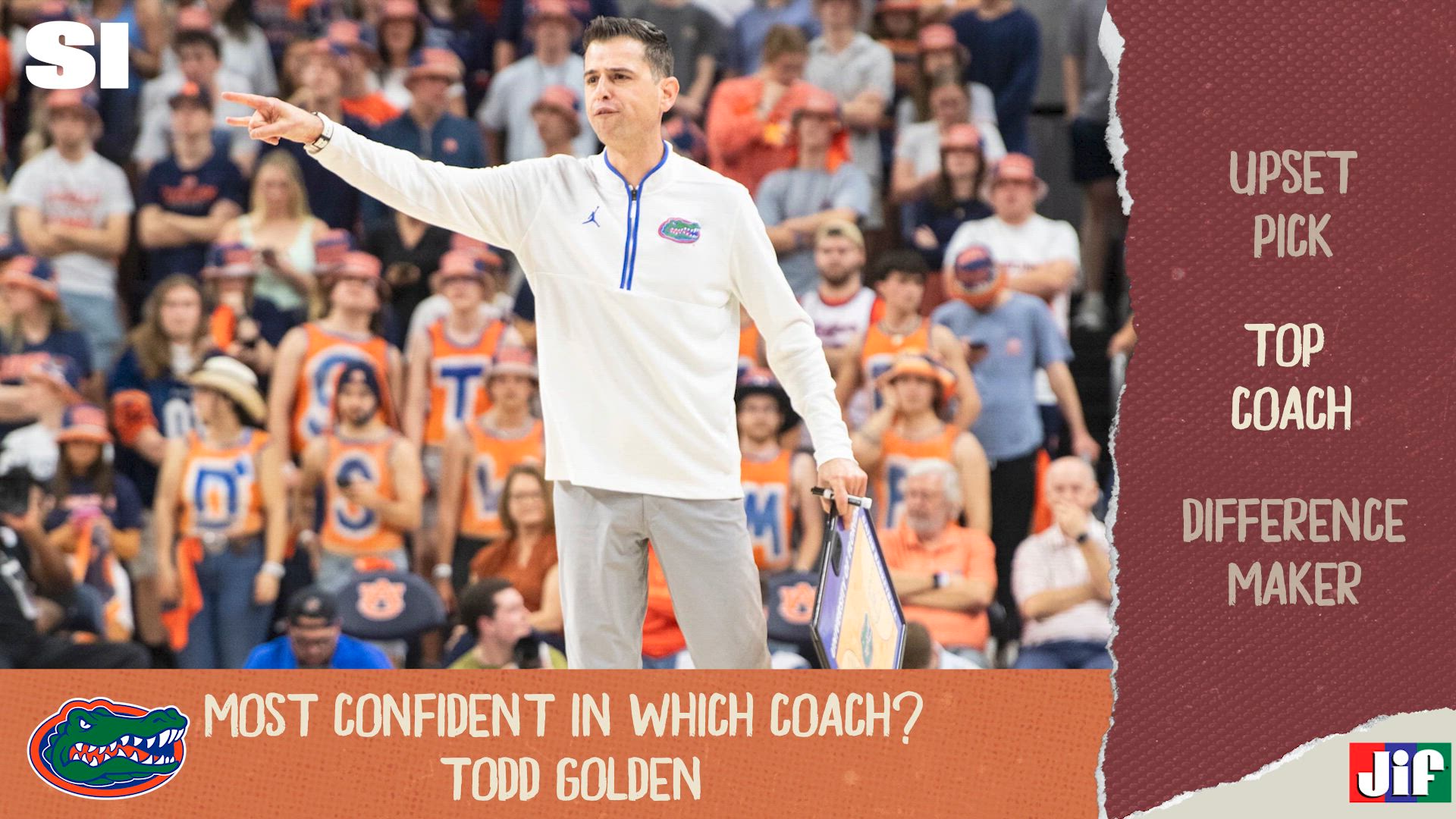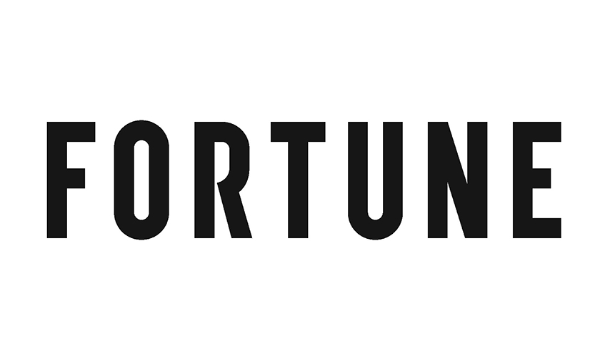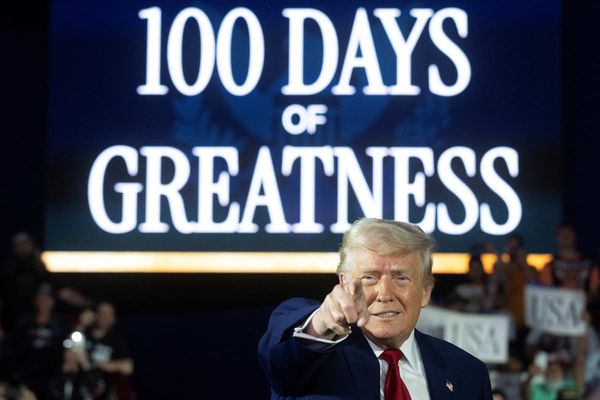
The game was in its final seconds, the victory at hand, the South Region championship secure. It was an odd time for Auburn guard Chad Baker-Mazara to be yelling angrily at star center Johni Broome.
Baker-Mazara had thrown a long pass ahead to Broome, who had heroically returned to the game from a scary elbow injury minutes earlier. Broome made a tentative effort to catch the pass, and a Michigan State defender had deflected the pass out of bounds with 4.6 seconds left. It was a no-harm play in that moment, but Baker-Mazara’s habitually hot head was steaming. A player with a history of technical fouls and flagrant fouls was in a sudden foul mood.
He gesticulated at Broome to come meet the pass, then turned to the Auburn bench and vented toward the coaches. Given the larger reality of a Final Four berth in hand, Broome ignored his tempestuous teammate, turning to the fans in Atlanta’s State Farm Arena and raising his arms in triumph. Coach Bruce Pearl calmly gestured for Baker-Mazara to relax.
Then the knobby-kneed 25-year-old, whose basketball career has wound from the Dominican Republic to a New Jersey high school to an Ohio prep school to Duquesne to San Diego State to a junior college to, at last, Auburn, finally read the room. Baker-Mazara broke into a broad smile and saluted the roaring blue-and-orange crowd, celebrating a joyful moment.
This is the Bruce Pearl method at work at Auburn. Stuff happens. Mostly winning happens, but also some other stuff that he manages to take in stride.

In building a championship team, Pearl will take a walk on the wild side with some of his players. He always recruits tough, athletic, fearless guys—but he also is not scared to bring some volatility into the mix. Some excitable boys. Some Chad Baker-Mazaras. Some launchers of atrocious shots and throwers of ridiculous passes. He will let those excitable boys be who they are within a team concept, instead of trying to squash them into basketball cyborgs.
“Dr. Tom Davis was my mentor,” said Pearl, who was an assistant to Davis at both Stanford and Iowa from 1982 to ’92. “Tom was incredibly patient. He really did believe that our job, when we get these kids, is to give them some space, let them be themselves. That was when you get the best out of them.”
Here is what Pearl has gotten out of this Auburn team: a 32–5 record, a championship in a historically powerful Southeastern Conference, the No. 1 overall seed in the NCAA tournament and a trip to San Antonio to chase the first men’s basketball national title in school history.
Is there dysfunction? Sometimes. Remember how this Auburn season started: an in-flight fight between freshman Jahki Howard and senior Ja’Heim Hudson forced the team’s charter to turn around en route to a Nov. 9 road game against Houston. That spurred a lot of, What the hell is wrong with Auburn? reaction in college hoops.
The answer? Nothing. The tamed Tigers got to Houston eventually and upset the Cougars. Howard and Hudson went from playing a combined 25 minutes in the season opener against Vermont to not playing at all in that one, or several games thereafter. Stuff happened, then stuff was worked out, and a fractious family came back together.
“We had a negative stigma about us,” guard Denver Jones said about the plane fight. “So we came out to prove a point. At the end of the day, we’re all going to have each other’s back. We’re going to be there for each other.”
Auburn players were walking into the interview room in Atlanta watching their own highlights on their phones, happily chattering about the plays they had just made to beat Michigan in the Sweet 16. Love and swagger were in the air. Pretty much everything about the Tigers is in public view, not much hidden. They are an open book of occasionally conflicting chapters.
The Tigers talk a lot about Christianity, fielding a question in a recent NCAA tournament news conference about “your love of the Lord.” Meanwhile, their Jewish coach disseminates staunch pro-Israel posts on social media and champions American conservatism. But Pearl has long had the chameleon characteristics that allow a Jew from Boston to thrive in the Deep South, and he has extolled Christian faith as a key element of this team.
Against that backdrop of piety, the Tigers will use some playground parlance when discussing their team.
Dylan Cardwell, who invokes Jesus at the beginning of every news conference, described his teammates thusly: “These guys got big balls, bro.”
And Pearl had this to say about his backcourt in a live TV interview from the SEC tournament: “My guards aren’t p----es.”
Colorful statements. Also true. The tenacity and self-assurance of the Tigers is abundant.
Pearl has empowered his players with vast freedom on the offensive end of the court. He has a high tolerance for heat-check shots and YOLO passes in exchange for unstinting defensive effort, a fair balance given the skill level of his current players. (Even in previous years, with teams not quite this good, Pearl had the patience of Job with the shot selection from guards like Wendell Green Jr. and K.D. Johnson.) The Tigers threw a pair of behind-the-back passes for turnovers against Michigan that would kill some coaches’ souls, but Pearl rode it out because his team also was generating turnovers.
Auburn may be reckless for stretches of every game. But Auburn is never tentative.
“There is a simple trade-off with me,” Pearl said. “Bad shots are not an issue. Take a possession off, pass on a physical play, don’t sprint back in transition because you’re tired—I’ve got issues with that. Making mistakes? Next play.”

Under that umbrella, freshman guard Tahaad Pettiford has a near-permanent green light. He ranks sixth on the team in minutes played, but second in shots attempted. Pearl’s faith in the Jersey City, N.J., guard—whom he refers to as “that little s---”—has been rewarded many times over. Pettiford scored 21 in that early win over Houston, 20 points at Duke and 21 at Kentucky. He’s averaging 17.3 points in four NCAA tourney games, up more than six points per game from the 33 previous games.
Pearl loves the fact that Pettiford has uttered no complaints about coming off the bench all season.
“Not a word,” Pearl said. “Not a body-language, shoulder-shrug, roll-eye ever from Tahaad. Because if he did, his dad [Travis] would slap it right out of him. The Jersey City toughness, it comes through all the time. The confidence.”
Confidence is contagious in the Auburn backcourt. Senior Miles Kelly, a transfer from Georgia Tech, is shooting a career-high 38.1% from three. Fellow senior Jones, primarily known as a defensive specialist, has made a career-high 64 threes this season. Kelly lit up Rupp Arena for 30 points on March 1, and Jones had a takeover stretch against Michigan that led to him scoring 20 points.
And then there is Baker-Mazara, who was ejected three minutes into Auburn’s first-round loss to Yale last season and has been tossed from a couple other games this season. Getting tossed for a Flagrant 2 foul in a loss to bitter rival Alabama in the regular-season finale moved Pearl to bench Baker-Mazara for the Tigers’ first game in the SEC tournament.
“We recognize Chad is incredibly emotional, passionate,” Pearl said. “His moods do swing. They do. First of all, like the Flagrant 2s are not acceptable. He recognized it, he’s accountable. Look, the opponents are going to see if they can get under his skin and see if he will retaliate. He can’t do that.”
Since then, Baker-Mazara has played controversy-free basketball. He’s also had some effective minutes at point guard and been the best feeder of Broome in the post in recent weeks. A bouncy 6' 7" defender, he also makes it difficult for opponents to get open shots on the perimeter and can dig down in the post.
“His energy is what drives him through the game,” Jones said of Baker-Mazara. “You can’t really contain him—you have to let him be who he is. When his energy’s up, boy, you’re in for a long night.”

Players who have been labeled hard to coach? Pearl has figured out how to coach them. Where some coaches may have gotten uptight putting a volatile player on the floor in win-or-go-home situations, he is riding with Baker-Mazara. He played a team-high 32 minutes against Michigan State.
“That’s respect,” Baker-Mazara said. “A lot of it is him believing in me. Yeah, sometimes I might go over the edge, but I’m not really trying to do that. That’s who I am—I’m a fiery person. He stays in my ear, tells me, ‘Be yourself, but at the same time try to be composed.’ I appreciate him a lot for that, because not a lot of coaches out here would do that. He’s pretty good not just with me, but with everybody.”
His players call him “BP” as opposed to “Coach.” Could you imagine, say, Bob Knight’s players referring to him as “BK” in a news conference? No.
BP is 65 years old, in the latter stages of one of the more interesting coaching careers in college basketball history. As with his teams, stuff has happened. Mostly winning has happened, but also some other stuff.
He became controversial before anyone really even knew who he was, surreptitiously recording a conversation with recruit Deon Thomas, who chose Illinois over Pearl’s school at the time, Iowa. Pearl asked Thomas if he received impermissible benefits from Fighting Illini assistant coach Jimmy Collins to sign with them, and the player indicated that he had. Pearl turned the recording over to the NCAA, sparking an investigation that led to sanctions against Illinois. Thomas later denied ever receiving impermissible benefits. In 2005, when asked if he forgave Pearl for the episode, Thomas said, “It’s hard to forgive a snake.”
A rising-star coach, Pearl believed he was blackballed by big-time schools after the Thomas affair. He became the head coach at Division II Southern Indiana and labored there for nine seasons—an unusually long time for a guy whose worst season at the school was 22–7 and whose best was a 29–4 national championship.
Milwaukee finally gave Pearl his D-I shot, and after a 26–6 run to the 2005 Sweet 16 in his fourth season, Pearl parlayed it into the Tennessee job. That’s where his salesman/carnival barker side shined through. There were bright orange suit coats, and then there were no coats (or shirts) at all—just Bruce with his chest painted in the stands at women’s basketball games.
He kept winning and earning NCAA bids in Knoxville, taking the Volunteers as close as they’ve ever come to a Final Four in 2010, then was busted by the NCAA for violations of his own. Pearl lied to investigators about hosting an impermissible cookout that was attended by blue-chip prospect Aaron Craft, earning a three-year show-cause penalty. He was out of coaching.

Auburn, no stranger to compliance issues, offered Pearl a second chance three years later. He’s become the most accomplished coach in school history, but not without another trip through the NCAA crime-and-punishment machinery. The Tigers were ensnared in the FBI investigation of corruption in college basketball, and the result was a self-imposed postseason ban for the 2020–21 season; vacating 12 wins from the 2016–17 season; and a two-game suspension for Pearl in 2021–22. A lesser coach at a different school would have seen his career come to an end at that point.
Auburn and Pearl rode it out together, and now he’s doing his finest work. If some coaches become more rigid as they get older, Pearl seems to be going the opposite way. He might be the ultimate player’s coach, finding ways to let his players be who they are while riding out flare-ups and fist fights.
Thus, an Auburn season that began with its charter plane being turned around could end with a group hug in the Alamodome.
More March Madness on Sports Illustrated
This article was originally published on www.si.com as Embracing the Passion and Dysfunction of Auburn, Bruce Pearl Is the Ultimate Player’s Coach.







